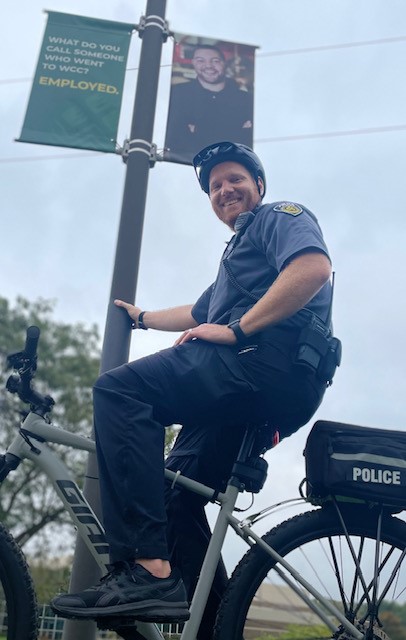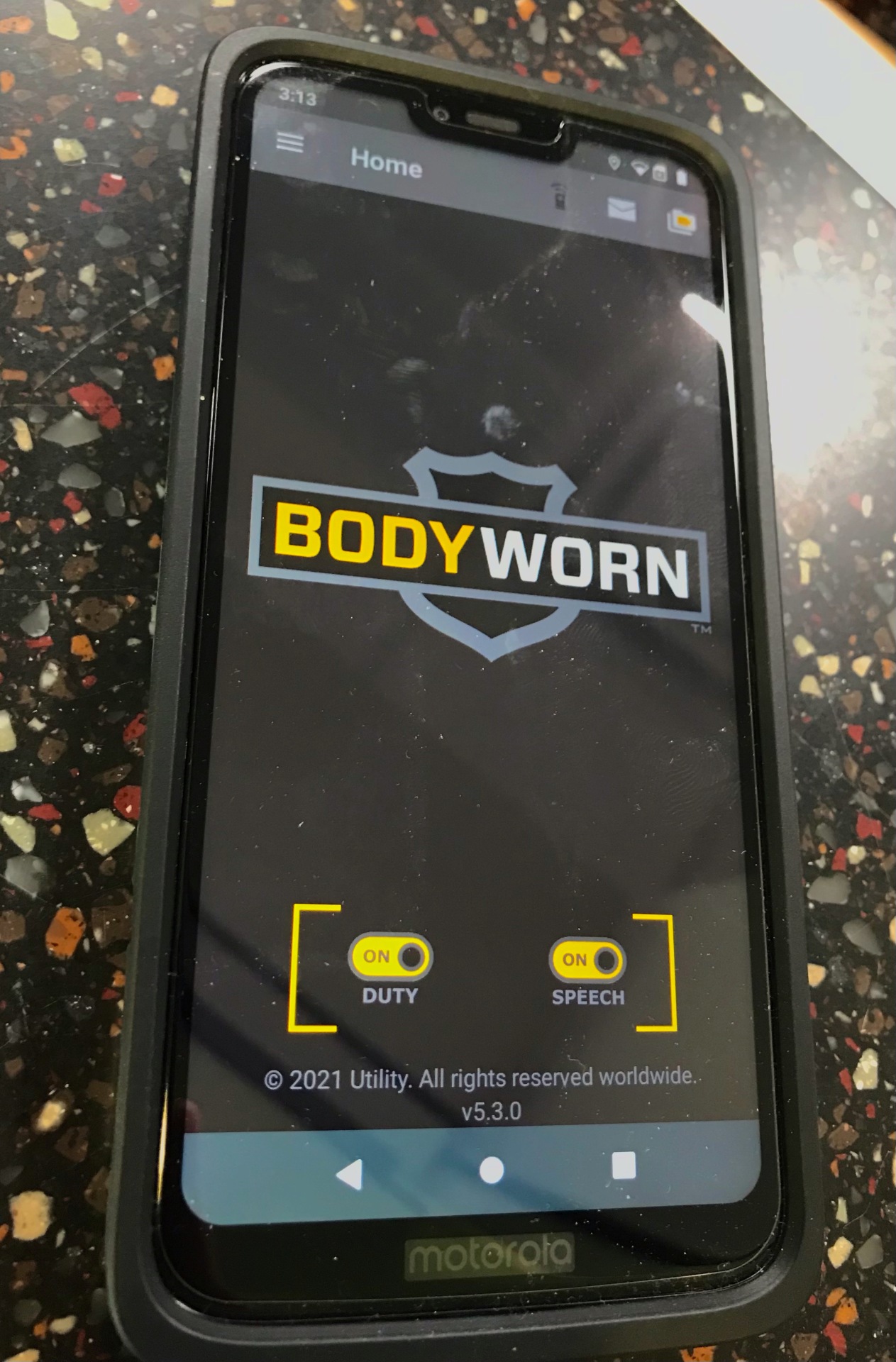

Officer Cameron Bauer sits on a WCC Safety Department Giant-brand bike. Courtesy of Jamie Zecman
by WILLOW SYMONDS
Staff Writer
WCC’s Public Safety Department made many changes this past year, and not just in response to COVID. Recently, sworn officers received two new additions: bicycle training and body cameras.
Before the bicycle program, security traveled across campus by motorized vehicle or by foot. The cars made much of the campus less accessible and harder to navigate.
The on-campus police department has two types of security: sworn and non-sworn. Sworn officers went through the police academy, carry firearms, respond to crimes, and have arrest authority. Non-sworn staff don’t get bicycle training and instead focus on patrolling by foot, locking up doors, and helping students find their way around campus.
Utility designed their Body Worn cameras to resemble smartphones that can be zipped up into vests. Full-time Deputy Chief Jamie Zecman’s camera sports a thick, black case, and the screen shows the digital time when held up.


Cutline for body camera screen : The body camera’s screen shows the brand name, Body Worn, made by Utility. Willow Symonds | Washtenaw Voice
Sworn police officers are required to wear body cameras anytime they’re on duty. However, they can turn the video recording on and off at will. When they tap their palms against the cameras in their vest, the voice announces, “RECORDING,” loud enough for both the officers and people nearby to hear.
The body cameras can also help police officers directly: they alert other officers if the wearer of the body camera appears to be lying down for too long. Zecman demonstrated by leaning over, to which the camera’s voice recording almost immediately began to count down from ten. When she sat up right, the countdown stopped.
However, lying down and tapping their cameras aren’t the only way to activate them. If they take their firearm out, their gun holster’s sensor triggers the recording. Students will most likely never see this happen, as officers pull their guns very rarely.
“Thankfully, WCC is very safe,” Zecman said. “Occasionally though, we do have crimes on campus. I would categorize it as rare compared to a big city police department.”
In summer 2021, the previous chief, Scott Hilden, sent two sworn officers to get certified in the bicycle program. The training teaches them how to ride up and down stairs, how to do the job when their heart-rate is up, and effectively and safely dismounting. Even though the department owns the Giant-brand bikes, the trainees also learn bike maintenance.
At the moment, three officers have received certification in bicycle riding, including Jamie Zecman, David Pasko, and Cameron Bauer.
Officer David Pasko sits on a WCC Safety Department Giant-brand bike. Courtesy of Jamie Zecman
Zecman believes that bikes are useful to the WCC officers because they have access to more areas, such as the sidewalks. They can zig-zag between cars in the parking lot. The bicycles also make hearing and talking to people easier, as they can get closer and don’t have to roll down windows.
“This makes interacting with the community easier,” she said. “We’re more approachable this way.”
The class costs $700 per trainee. Luckily, the General Fund pays for the classes, along with the bicycles, the helmets, and the uniforms.
While bikes can’t carry as many items as motorized vehicles, officers can attach pouches that read “POLICE” above the back wheel. These pouches hold anything they can’t wear on their belt while riding, such as paperwork, ticket books, and medical supplies.
A WCC welding major, Nathaniel Burke, who believes that having a police force on campus is important, said he’s in favor of these changes.
“I do believe the body cams will provide the officers with […] security and safety against wrong accusations as well as helping document the crimes,” Burke said. “As for the bikes, I believe that they will provide the officers a more versatile method of transport on campus.”
Jamie Zecman thinks that the bicycles and the body cameras have “absolutely” been an improvement.
“We’re essential workers,” Zecman said. “We have our doors open 24/7; we can’t just close like a bank. […] Especially during COVID, the cameras and the bikes have been successful.”
Lily Cole | Editor ONGOING COVERAGE WCC policies that deal with diversity, equity and inclusion…
Summer semester students will be among first to see full shift Alice McGuire | Deputy…
Experts share insights on how to file, education credits Yana McGuire | Staff Writer U.S.…
Teresa Quinones | Contributor Eric Jiskra vividly remembers sitting in the passenger seat of his…
Beck Elandt | Staff Writer Tariffs announced in early February have been in effect since…
How cost of living compares for 2-year, 4-year students Beck Elandt | Staff Writer When…